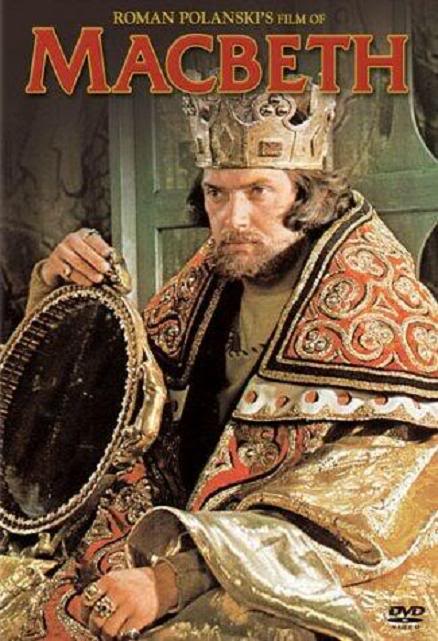
http://i178.photobucket.com/albums/w262/djinn80/macbeth%20musti/00000457.jpg
|
ACT 1- SCENE 1 THUR 7 |

Links: |
Macbeth Study Guide Plot Outline The play is set in Scotland during the 11th century. The Scots are fighting against the invading Norwegians. Act 1 Scene 1 The three witches plan their next meeting: with Macbeth on the heath when the battle has been decided. Key quote: 'Fair is foul, and foul is fair Hover through the fog and filthy air.' (1.1.9-10) Questions: 1. What is the atmosphere of this scene? 2. What questions does the audience ask at this point? Scene 2 The battlefield with King Duncan, Malcolm and Donalbain (his sons) and a lord, Lennox. The Scottish are fighting against the Norwegians and the rebel Scot, Macdonwald. A soldier enters with news of the battle: it was an even battle until Macbeth fought the rebel and 'unseam'd him from the nave to the chops,/ And fix'dhis head upon our battlements.' (1.2.22-23) Question: What does this action tell us about the kind of man Macbeth is? The Norwegians begin a fresh assault but are rebuffed by Macbeth and Banquo. The Scottish forces win the battle. The Norwegian king, Sweno, wants to make peace. As a reward for his efforts, King Duncan intends to make Macbeth Thane of Cawdor. (A thane is a nobleman, a lord. Macbeth is already Thane of Glamis.) Scene 3 The witches show what kind of power they have over people. Macbeth and Banquo happen to meet them: 'So foul and fair a day I have not seen' says Macbeth. When Banquo and Macbeth see the witches they question them. The witches greet Macbeth in three ways: 1. 2. 3. And the witches also tell Banquo three things: 1. 2. 3. Questions: 1. Macbeth does not know he is to be made Thane of Cawdor so how do the witches know? 2. How does Banquo react to this greeting? 3. What does Macbeth want to know from the witches? Immediately after this meeting Ross tells Macbeth the news of his new title. Banquo asks 'What! Can the Devil speak true?' (1.3.106). Banquo is worried about the witches' statements or prophecies: (fill in the blank) And oftentimes, _________________________________________________________ In deepest consequence. (1.3.123-126) Questions: 1. In what ways could Macbeth become King? 2. What are his feelings about these possible ways of action? 3. What do you think Macbeth will do to become King? Scene 4 The traitorous Thane of Cawdor has been executed and the King regrets the Thane's treachery. He had trusted him: 'He was a gentleman on whom I built An absolute trust.' (1.4.14-15) Macbeth meets King Duncan and professes his loyalty. This is an example of dramatic irony because Macbeth is now Thane of Cawdor and he will also be a traitor to the king. Duncan makes his son, Malcolm, Prince of Cumberland, heir to the throne of Scotland. This is a blow to Macbeth. Question: What does Macbeth intend to do? Stars, hide your fires, Let not light see my black and deep desires; The eye wink at the hand, yet let that be Which the eye fears, when it is done, to see. (1.4.52-55) Scene 5 Lady Macbeth reads a letter from her husband. He tells her of the witches' prophecies and that already he has been made Thane of Cawdor. Lady Macbeth thinks about his character in a soliloquy: I do fear thy nature, It is too full o' th' milk of human-kindness To catch the nearest way. (1.5.15-16) Lady Macbeth decides to influence or encourage Macbeth to kill Duncan so that he can become king quickly. She asks the spirits to fill her with 'direst cruelty' (1. 7.43). Macbeth comes home with the news that the king is to stay with them that night. This will give them the opportunity to 'provide' for him (1.7.67), that is, kill him. Question: 1. What does this scene tell us about the character of Lady Macbeth? 2. What does this scene say about the power of women? Scene 6 King Duncan comes to Macbeth's castle full of happiness and commenting on the pleasant surroundings. Little does he know of Lady Macbeth's plans! This is an example of dramatic irony, where the audience knows more than the characters on stage who speak innocently about future events. Lady Macbeth offers her hospitality, to look after the king while he stays with them. Question: What is the name of Macbeth's castle? Scene 7 Macbeth's soliloquy about the murder of Duncan show his conflict. Against: * God will damn him in his future life * People on earth will hate or judge him while he is alive * Macbeth is family to the king * Macbeth is his subject * Macbeth is the king's host * Duncan is a good king and everyone will know that the murder was a terrible act For: * ambition I have no spur To prick the sides of my intent, but only Vaulting Ambition, which o'erleaps itself, And falls on th' other. (1.7.25-7) Question: Should Macbeth murder Duncan? Macbeth decides not to go ahead: 'We will proceed no further in this business' (1. 7.31). Lady Macbeth reacts violently. She accuses him of being a coward, less than a man. Macbeth seems easily convinced by her attack and decides to kill the king. They will have to pretend that they have no plans against Duncan: False face must hide what the false heart doth know. (1.7.83) Questions: 1. What does the audience think of Lady Macbeth? 2. What kind of man is Macbeth? 3. Who actually plans the murder? |